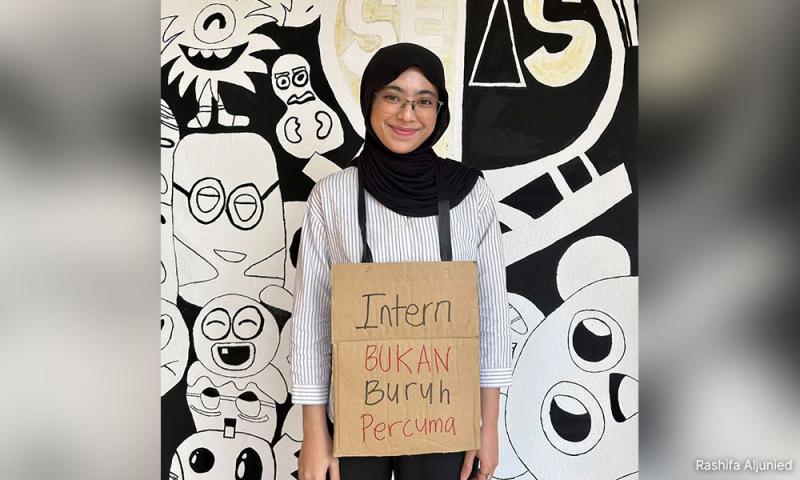LETTER | Why pay interns?
LETTER | I am very glad that Rashifa Aljunied kicked off the #InternBukanBuruhPercuma campaign. I have spent almost a decade working in the field of human rights, and I have the fortune and misfortune of telling the world this.
“As a human rights organisation, I ensure that my interns are paid a minimum wage as an organisational policy.”
On the one hand, I am doing my part to ensure fair labour practices that I believe in are reflected in the organisation I belong to. On the other hand, the fact that I occasionally find a need to express this explicitly to prospective interns, collaborators, or other colleagues highlights the reality that not all human rights organisations share the same values.
Interns are not provided pay across all human rights organisations, and even when they do provide pay, it may not be anywhere close to minimum wage.
Some are happy to maintain a policy of “no paid internship” that are by nature exploitative with the excuse that a human rights organisation is non-profit and cannot or should not be paying for internships or that human rights organisations are underfunded, and we should not allocate internship allowances or salaries.
Others run with that justification and provide a token sum of payment to cover meals and transportation.
Personally, I do not think any of the justifications have merits. It is not whether a human rights organisation can or should provide for paid internships, but a question of whether a human rights organisation can afford not to pay interns. Here are two reasons why I think human rights organisations must provide paid internships at a reasonable rate.
Discrimination and diversity
Not paying for an internship is a form of discrimination. When we do not provide a reasonable amount of salary or allowance to interns, we are effectively discriminating against those who cannot afford to undertake unpaid labour for a prolonged period or those who may need to relocate themselves to participate.
Many would immediately be deprived of an opportunity to participate as they cannot afford to be at an internship that does not provide for their basic needs. Leaving the pool of possible interns to those with the financial wealth to participate in unpaid work or those that had the fortune of benefiting from a university grant for them to be at an internship.
Thanks to Belanjawanku, we can say that those who are not able to at least afford RM1,800 a month will be disqualified before even their capabilities and potential are ascertained. For those based outside of Klang Valley, there will be an additional expectation (also another point of discrimination) that they can afford relocation in addition to the cost of living while in Klang Valley.
Even then, let’s not kid ourselves. Many of us made fun of how ridiculous the cost allocation described in Belanjawanku was. The minimum wage is not enough to sustain a person in the Klang Valley.
With that in mind, what does that leave us with when we hire unpaid interns? What is left would be a person that has someone who provides them with something more than minimum wage on a monthly basis with no expectations of return, and that person must originate or stay long-term in Klang Valley.
Other than a person that fits the two above-mentioned criteria, the others who would be able to afford the unpaid internship would be those who are able to enrol in university and have the benefit of a scholarship or grant that provides for them.
For a human rights organisation, the suggestion that we are by design or through our policy discriminatory in nature should be anathema and spark an immediate change. Especially when the discrimination stifles and limits the diversity of our employees, members, or volunteer.
he discriminatory practice and its effect are not only an affront to the human rights values we seek to uphold, but it also actively damages the cause by blinding us with a narrow perspective and lived experience.
I would like to be optimistic and believe that human rights organisations in Malaysia would take up Rashifa’s call and support her call by implementing fair pay for interns and showing other organisations, and possibly even for-profit organisations, the viability, and benefit of having paid internships. But the unfortunate reality is that the policies I set for my workplace are an outlier more so than a norm.
The only thing I can do for now is to make an open call to my colleagues within the human rights field in Malaysia. We are supposed to defend and uphold human rights. While we work on the bigger picture of making Malaysia a better place, the least we can do is practice what we preach at home. Pay an intern what they deserve and support the call.
For Rashifa and others who share her hopes and aspiration for tomorrow, push on with your cause, and don’t let the naysayers hold you back.
DOBBY CHEW is the executive coordinator at Anti-Death Penalty Asia Network and director of Muda’s Human Rights Bureau.
The views expressed here are those of the author/contributor and do not necessarily represent the views of Malaysiakini.
RM12.50 / month
- Unlimited access to award-winning journalism
- Comment and share your opinions on all our articles
- Gift interesting stories to your friends
- Tax deductable
